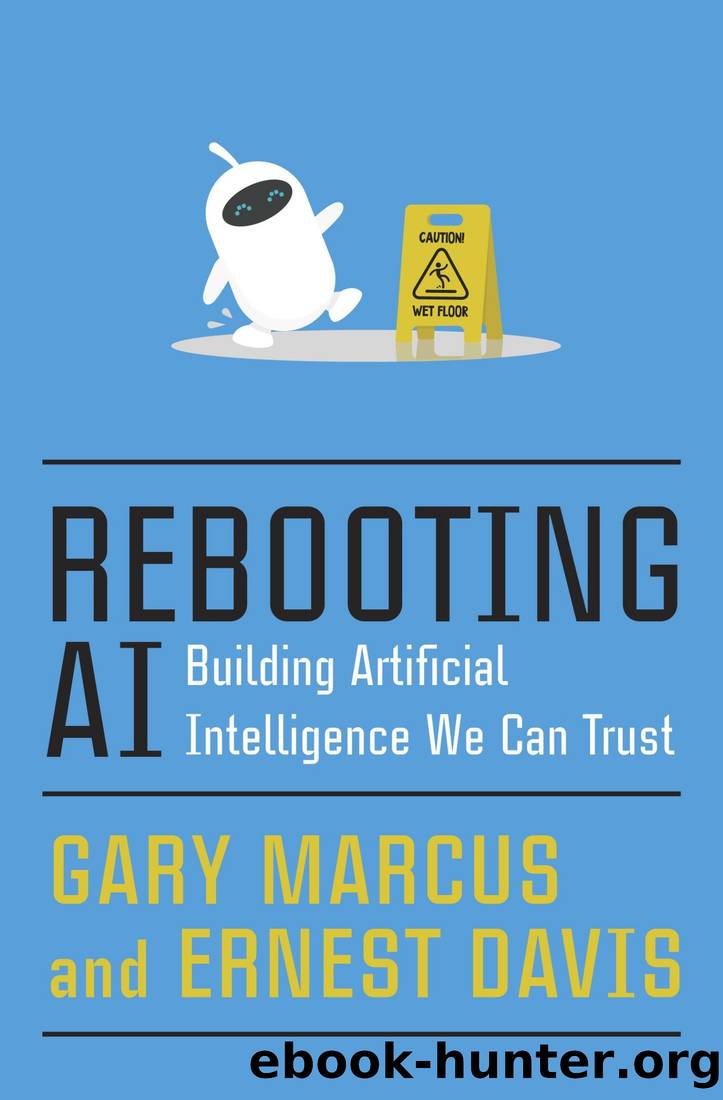Rebooting AI: Building Artificial Intelligence We Can Trust by Ernest Davis

Author:Ernest Davis [Davis, Ernest]
Language: eng
Format: epub
Amazon: B07MYLGQLB
Publisher: Pantheon
Published: 2019-09-09T23:00:00+00:00
9. CAUSAL RELATIONS ARE A FUNDAMENTAL ASPECT OF UNDERSTANDING THE WORLD.
As Turing Award winner Judea Pearl has emphasized, a rich understanding of causality is a ubiquitous and indispensable aspect of human cognition. If the world was simple, and we had full knowledge of everything, perhaps the only causality we would need would be physics. We could determine what affects what by running simulations; if I apply a force of so many micronewtons, what will happen next?
But as we will discuss in detail below, that sort of detailed simulation is often unrealistic; there are too many particles to track in the real world, and too little time.
Instead, we often use approximations; we know things are causally related, even if we donât know exactly why. We take aspirin, because we know it makes us feel better; we donât need to understand the biochemistry. Most adults know that having sex can lead to babies, even if they donât understand the exact mechanics of embryogenesis, and can act on that knowledge even if it is incomplete. You donât have to be a doctor to know that vitamin C can prevent scurvy, or a mechanical engineer to know that pressing a gas pedal makes the car go faster. Causal knowledge is everywhere, and it underlies much of what we do.
In Lawrence Kasdanâs classic film The Big Chill, Jeff Goldblumâs character jokes that rationalizations are even more important than sex. (âHave you ever gone a week without a rationalization?â he asks.) Causal inferences are even more important than rationalizations; without them, we just wouldnât understand the world, even for an hour. We are with Pearl in thinking that few topics in AI could be more important; perhaps nothing else so important has been so neglected. Pearl himself has developed a powerful mathematical theory, but there is much more to explore about how we manage to learn the many causal relationships that we know.
Thatâs a particularly thorny problem, because the most obvious route to causal knowledge is so fraught with trouble. Almost every cause that we know leads to correlations (cars really do tend to go faster when you press the gas pedal, so long as the engine is running and the emergency brake hasnât been deployed), but a lot of correlations are not in fact causal. A roosterâs crow reliably precedes dawn; but any human should be able to tell you that silencing a rooster will not stop the sun from rising. The reading on a barometer is closely correlated with the air pressure, but manually moving a barometer needle with your hands will not change the air pressure.
Given enough time, itâs easy to find all kinds of purely coincidental correlations, like this one from Tyler Vigen, correlating per capita cheese consumption and death by bedsheet tangling, sampled from the years 2000â2009.
Download
This site does not store any files on its server. We only index and link to content provided by other sites. Please contact the content providers to delete copyright contents if any and email us, we'll remove relevant links or contents immediately.
| Computer Vision & Pattern Recognition | Expert Systems |
| Intelligence & Semantics | Machine Theory |
| Natural Language Processing | Neural Networks |
Algorithms of the Intelligent Web by Haralambos Marmanis;Dmitry Babenko(17650)
Jquery UI in Action : Master the concepts Of Jquery UI: A Step By Step Approach by ANMOL GOYAL(10069)
Test-Driven Development with Java by Alan Mellor(7753)
Data Augmentation with Python by Duc Haba(7626)
Principles of Data Fabric by Sonia Mezzetta(7402)
Learn Blender Simulations the Right Way by Stephen Pearson(7309)
Microservices with Spring Boot 3 and Spring Cloud by Magnus Larsson(7156)
Hadoop in Practice by Alex Holmes(6701)
RPA Solution Architect's Handbook by Sachin Sahgal(6533)
The Infinite Retina by Robert Scoble Irena Cronin(6239)
Big Data Analysis with Python by Ivan Marin(5959)
Life 3.0: Being Human in the Age of Artificial Intelligence by Tegmark Max(5542)
Pretrain Vision and Large Language Models in Python by Emily Webber(4916)
Infrastructure as Code for Beginners by Russ McKendrick(4676)
Functional Programming in JavaScript by Mantyla Dan(4513)
WordPress Plugin Development Cookbook by Yannick Lefebvre(4411)
The Age of Surveillance Capitalism by Shoshana Zuboff(4274)
Embracing Microservices Design by Ovais Mehboob Ahmed Khan Nabil Siddiqui and Timothy Oleson(4167)
Applied Machine Learning for Healthcare and Life Sciences Using AWS by Ujjwal Ratan(4156)
